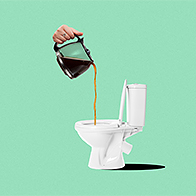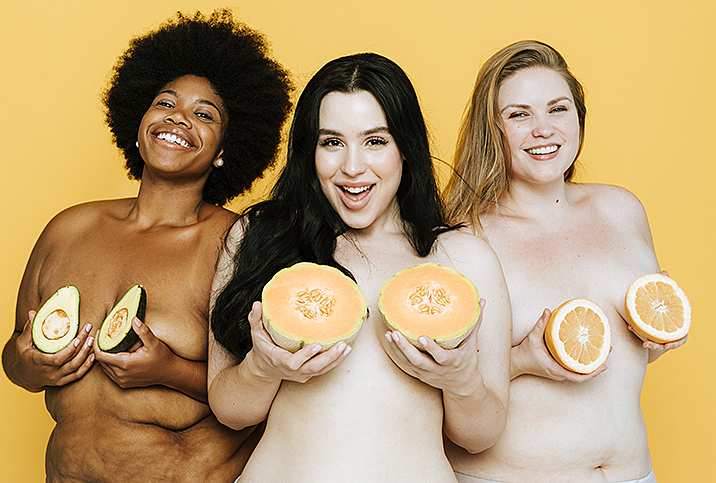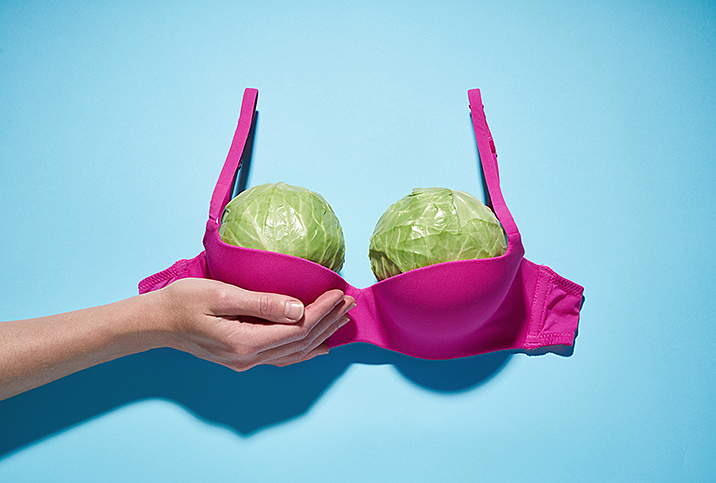The Connection Between Caffeine Intake and Breast Density

Maybe you can't get through your morning without a couple of cups of coffee. Or maybe your midafternoon pick-me-up inevitably includes an energy drink and a piece of dark chocolate. Or maybe your health kick involves a copious amount of green tea. Whatever your personal preference, if your daily caffeine intake could be described as "impressive," then you've probably wondered how it may be affecting your health—including your breast health.
And to be honest? There's reason to wonder.
In fact, studies have been conducted to determine if there's a connection between caffeine and breast density, which is a risk factor for breast cancer. While the results aren't entirely clear and more research is needed, there are a few details to know about caffeine intake and breast health.
Research on caffeine and breast health is limited
As of 2022, three major studies have looked at a possible link between caffeine intake and breast density. Two of those studies, published in 2000 and 2020, each found no connection, but another published in 2018 did find a slight association. So what gives?
First, it's important to understand what each of these studies was investigating.
The 2000 study
The 2000 study published in the journal Cancer Epidemiology, Biomarkers & Prevention looked at nutrient intake based on self-reported questionnaires and compared that with how dense females' breasts were, adjusting for women's menopausal state to identify potential nutrient-based risk factors.
Caffeine was one of the many nutrients examined and it didn't come up as a potential problem for pre- or postmenopausal women. Of course, relying on self-reported nutrient intake isn't always the most reliable method of data gathering, so it's hard to know exactly how accurate the information was, but given the data set included more than 1,500 women, it's a solid reference point for the later studies.
The 2020 study
The 2020 study published in the European Journal of Nutrition looked specifically at whether adolescent caffeine intake affected premenopausal breast density.
Researchers looked at the breast density profiles of 751 premenopausal females who answered food frequency questionnaires about their own adolescent nutrient intake, including caffeine consumption. Based on their answers, researchers cross-referenced the caffeine intake information with the breast density profiles (controlling for other possible factors) to see if caffeine might increase the risk of dense breast tissue.
Across the board, there was no link found between adolescent caffeine intake and premenopausal breast density.
The 2018 study
What was different about the 2018 study?
This study, published in the journal Breast Cancer Research and Treatment, used the same data set as the 2020 study but analyzed a greater number of the participants, 4,130. This time, researchers looked at caffeinated versus decaffeinated coffee intake, menopausal status and the possible impact of hormone therapy.
In essence, more factors were analyzed within a larger data set, and the results were surprising. Overall, in both pre- and postmenopausal women, decaffeinated and total caffeine consumption were inversely associated with percent breast density. In other words, the women who drank more coffee—whether decaffeinated or caffeinated—had less dense breasts.
Of the 4,130 participants, 1,823 were premenopausal and 2,307 were postmenopausal. Premenopausal women in the highest caffeine intake quartile had a mean percent breast density of 37.4 percent, compared with 40.6 percent for premenopausal women in the lowest caffeine intake quartile. The postmenopausal women in the highest caffeine intake group had 25.5 percent mean percent breast density, compared with 26.2 percent for the lowest caffeine intake group.
Additionally, in a multivariable analysis, the researchers found drinking two or more cups of decaffeinated coffee was associated with a 2.6 percent increase in percent breast density for premenopausal women but a 2.4 percent decrease in percent breast density for postmenopausal women.
Lastly, the researchers looked at postmenopausal women who were taking hormone therapy (HT). Among current postmenopausal HT users, regular coffee and caffeine intake were inversely associated with percent breast density and the highest caffeine intake quartile was associated with a 3.3 percent decrease in percent breast density.
The researchers noted that studies consistently show HT users have increased breast density—which raises breast cancer risk—and so their findings that drinking coffee might reduce the effect of HT on breast density is potentially good news for breast cancer prevention. Of course, more research is needed, especially because the findings on HT and caffeine intake weren't statistically significant in this study.
Really, it's the perfect picture of the world of science: The studies we look to for answers often leave us with more questions. Many more decades may pass before there's a deep enough body of research to make solid assumptions directly related to caffeine (or coffee) and breast density.
However, the body of research as a whole on nutrient intake and breast density is broader, and doctors can make a lot of good inferences about the role caffeine plays in breast health.
Why does it matter how dense your breasts are?
Breast density is an independent and significant risk factor for breast cancer, and there's not much you can do to control your personal level of density. "Breasts contain ducts, lobules and fatty and fibrous connective tissues. Breast density refers to how much fibrous and glandular tissue is present in your breast compared to the number of fat tissues, and it is not related to the size of the breast and its firmness," explained Veena Madhankumar, M.D., an OB-GYN at iCliniq, a virtual hospital with headquarters in Tamil Nadu, India.
"Breast density can be caused by various factors, like earlier age at the onset of menstruation, less than 11 years; a shorter menstrual cycle length of fewer than 25 days; later age at menopause, more than 53 years; prior benign breast disease, and if you're premenopausal," Madhankumar said.
While you can't control all of the factors that affect breast density—it's not like you can control the age you started your period—Madhankumar said diet, lifestyle and environment can play roles. This is why researchers look into the effect of different dietary habits and nutrient intake to determine what factors, positive or negative, might impact breast density.
Nutrient intake and breast density
While coffee and caffeine shouldn't be vilified in relation to breast density—and may actually be beneficial based on the 2018 study results—there are other nutritional risk factors that shouldn't be overlooked.
"A Spanish study has found that overweight and obese women who eat a Western-style diet, such as high-fat dairy products, processed meats [bacon, ham, salami], refined grains [white bread, pasta, white rice], sweets and sweetened drinks, convenience foods [pizza, french fries, chips] and sauces [mayonnaise, ketchup], may develop denser breast tissue, thus, increasing their risk of breast cancer," said Constance M. Chen, M.D., a board-certified plastic surgeon and breast reconstruction specialist in New York City.
Essentially, this confirms what you likely already know: A high-fat, high-sugar, processed food diet does nothing positive for your overall health, including your breast health. But that also means the reverse is true: If you stick to a healthy diet, you may be able to help manage some level of your breast density and reduce your risk of breast cancer, which is really the goal, right?
"Foods which can decrease the risk of breast cancer include citrus fruits, green leafy vegetables, berries, cruciferous vegetables, fatty fish, fermented foods, and eating patterns like the Mediterranean diet," said Kecia Gaither, M.D., M.P.H., board-certified in OB-GYN and maternal-fetal medicine, and director of perinatal services at NYC Health + Hospitals/Lincoln in the Bronx in New York City.
Other ways caffeine may impact breast health
While caffeine intake or coffee consumption may not significantly impact breast density—at least, not in a way that merits lifestyle change—there may be other reasons to cut back on or add to your morning cuppa joe.
"While recent studies have found little to no association between caffeine and breast density, some experts believe that large amounts of caffeine intake can lead to changes in hormone levels that can affect the formation of breast cysts or cause breast pain," Chen said. "Thus, a woman with breast pain or multiple biopsies for breast cysts can try lowering her caffeine intake to see if it helps her symptoms."
She added that other studies have found a link between coffee intake and a lower risk of breast cancer in postmenopausal women.
"More highly caffeinated coffee was found to reduce breast cancer risk, with higher consumption related to a higher reduction in risk," Chen said.
'While genetics may not be in your control, one thing women can control is what they ingest into their bodies to minimize their odds of developing breast cancer.'
So for those of you who can't fathom cutting back on your four-cup-a-day habit, it might not be necessary, especially given another piece of recent research Chen touched on: "New research suggests that drinking coffee after breast cancer treatment may improve survival."
That's certainly news worth cheers-ing over a cup of coffee.
"At the end of the day, breast cancer is likely to be a combination of genetic and environmental factors. While genetics may not be in your control, one thing women can control is what they ingest into their bodies to minimize their odds of developing breast cancer," Chen said.
Instead of cutting back on caffeine, if you want to take steps to reduce your risk of dense breasts and the development of breast cancer, take a look at your overall diet and start adding more fruits and vegetables to your daily menu.




















